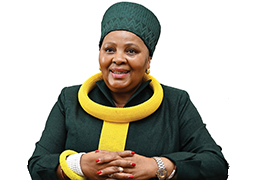
For a soundbite of NA Speaker, Ms Nosiviwe Mapisa-Nqakula, click on this link: https://iono.fm/e/1413533
Parliament, Thursday, 7 March 2024 – National Assembly Speaker, Ms Nosiviwe Mapisa-Nqakula today urged speakers of world parliaments to advance deliberate gender-sensitive budgeting to support legislation and oversight initiatives that support the plight of women.
She said by integrating a gender perspective into budgeting processes and effectively monitoring the impact of policies and programmes, governments can ensure that resources are allocated in a way that promotes gender equality and that the desired outcomes are achieved.
“In this way, we can ensure that governments can allocate funds specifically targeted at initiatives that support girls’ education, such as scholarships, transportation subsidies, and the construction of safe and inclusive school facilities,” said the Speaker.
Ms Mapisa-Nqakula addressed a roundtable discussion exploring critical themes on equality in education, health, and combating violence against women on day two of the 2024 Women Speakers’ Summit underway in Paris, France.
The Summit concludes today.
“Additionally, gender-responsive budgeting can be used to invest in teacher training programmes that promote gender-sensitive teaching methods and curriculum development that challenges gender stereotypes,” she said.
Speaker Mapisa-Nqakula told her counterparts that parliaments can play a pivotal role in dismantling the historical socio-political entrenchment of gender inequality that has created deep-rooted systems of power and discrimination and that have perpetuated disparities between genders for centuries.
She implored them to steer their countries’ parliaments toward implementing laws and regulations that safeguard women’s rights, allocating funds to support educational and healthcare programmes for women and girls, and establishing comprehensive strategies to prevent and address gender-based violence.
“Through policy-making, resource allocation, and legislative initiatives, they can create an enabling environment for the advancement of gender equality,” she said.
Ms Mapisa-Nqakula shared with delegates how South Africa’s firm decision to strengthen gender-responsive budgeting and impact monitoring is beginning to yield positive results. These are important tools that significantly help address gender inequality, including in areas of education, health, and the fight against gender violence, she said.
She encouraged delegates to integrate gender-sensitive budgeting in all sectors and industries, including health and crime prevention.
“Similarly, gender-responsive budgeting can be employed to address the unique health needs of women and girls, as well as mitigate the disparities in access to healthcare services. This may involve allocating resources to improve maternal health services, expanding access to reproductive healthcare, and supporting programmes that address gender-specific health issues,” she added.
The summit creates an important platform for sharing best practices, ideas, and collaboration on strengthening progress in sexual and reproductive health, the transformation of educational models to ensure access for young girls to the sectors of the future, and legislative advances to curb violence against women.
ISSUED BY PARLIAMENT OF THE REPUBLIC OF SOUTH AFRICA

